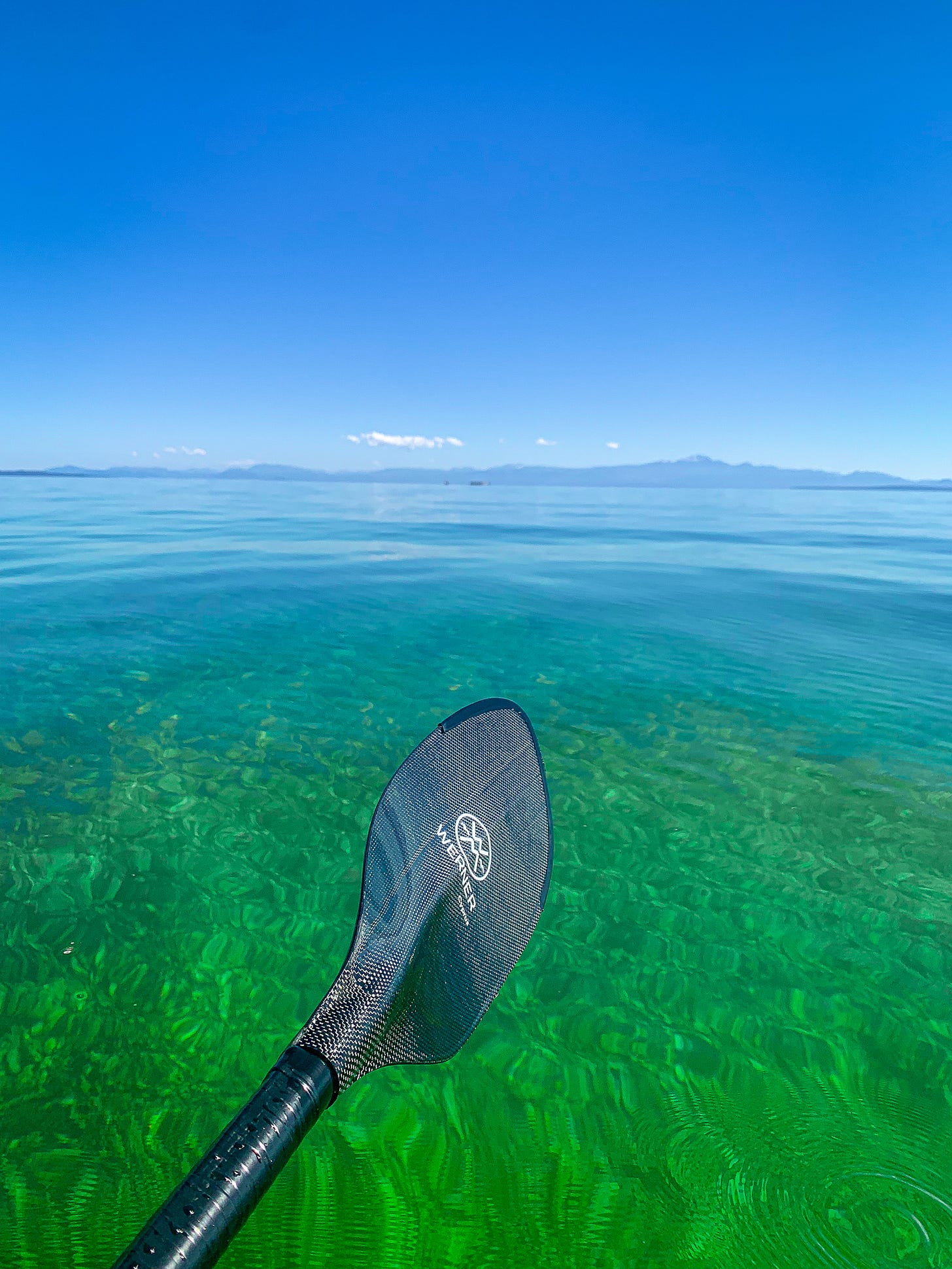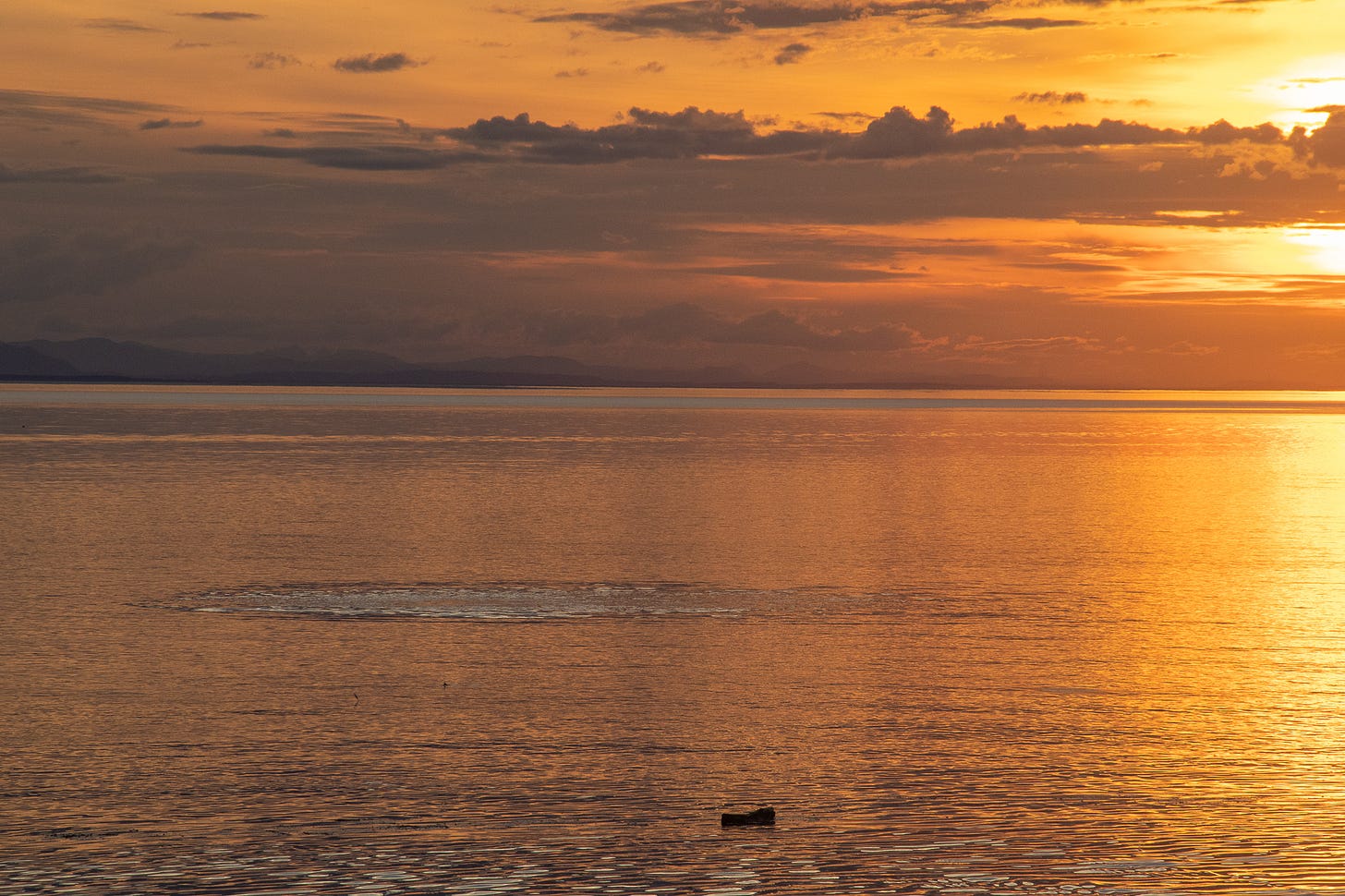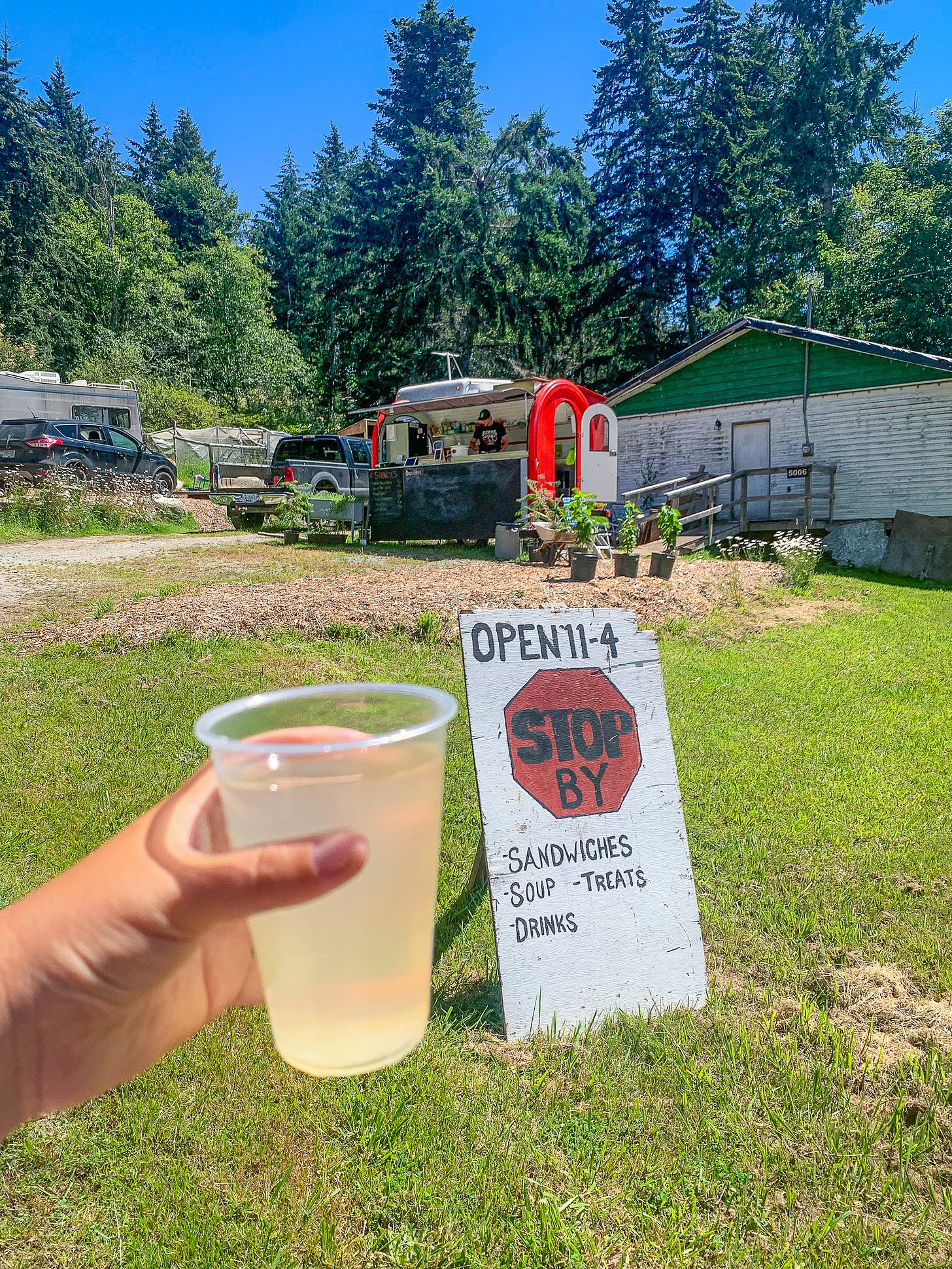No Sour Cream on the Island
on remoteness
It was game over when we pulled up to Shelter Point and smelled the concession stand. Eighteen hot, sticky miles from Powell River around north Texada Island finishing against the flood current, eight days of paddling to Bellingham to go with all the time in the world to do it, Shelter Point and its concession stand was absolutely the place to be.
When we pulled up on the beach Andy unpacked his wallet first.
When you last heard from us, we had just finished over 20 days in the Discovery Islands wilderness with no one to talk to but each other. The 20 days in the Desolation Sound and Discovery Islands were, despite being the deepest into the true wilderness we ventured, also the easiest section of the trip. From here on out, we were grinding south. That meant 1) a long crossing of the somewhat gnarly Strait of Georgia 2) limited fresh water to filter from 3) retracing our steps through seas we had already paddled while northbound and 4) competing with tourists and other paddlers for campsites.
Texada Island itself, despite relative proximity to Vancouver, is a self-described “off-the-beaten-path” tourist destination. While only 40 miles as the crow flies from Vancouver, in actuality Texada is a full day of travel including three ferries from Vancouver. All along the British Columbia coast deep fjords, mountains, and the nature of islands themselves act as a natural barrier to tourists and development. As a result places like Texada Island maintain a relative sense of “remoteness”.
Our first time on Texada Island in early June we paddled against a headwind both days. The south end of the island has high, mountain-like slopes, steams and ravines. Along a cobble beach there I found blue and purple sea glass and tucked it in my PFD (life jacket).
In June we rolled into the Shelter Point Campground around 7pm, ate dinner, collapsed exhausted, and then paddled hard in to Powell River the following day. Our hands bled from blisters, and our shoulders ached from straining against the wind for 40 miles straight. This was back before I managed to get extremely sick in the backcountry and we recalibrated our route and goals accordingly.
This time we landed around 5pm and found the park much less empty and much more inviting (read: we found hot burgers and cold root beer). Andy picked out a site with a little bit of privacy and all three of us settled in knowing almost certainly we’d be windbound for the next 2-4 days.
I really can’t overstate the joy of a concession stand when you’ve been out in the wilderness eating dehydrated meals for two months.
Andy came back from the concession stand in full paddling gear with a burger and fries in hand.
“I wanted nachos but there’s no sour cream on the island.”
“What?”
“Yeah, the woman working made it sound like they just, don’t do sour cream here.”
Andy might’ve misheard, but it wouldn’t be that strange for a small island in British Columbia to be sour cream-less. In places like Texada not only can getting supplies itself be difficult, but I imagine the joy of telling unsuspecting city folks that there’s literally no sour cream on the island is unmatched. Remoteness is also cultural; often the people who live in remote places have actively sought out the solitude, are loners or otherwise tree-hugging hippies. That, or they’ve simply been in the remote place their whole lives. No matter how you slice it, life on an island is markedly different from life in the nearest city, and there is a certain hard-earned pride that comes with living in a place with no sour cream.
Remote as Texada may be by modern standards, the popular Shelter Point Campground has been occupied by humans for 3,000 years. Archeological evidence indicates that the ancestors of the Tla’amin and Coast Salish First Nations likely used the point as a place to process deer meat. Texada is large and like many of the Gulf Islands has none of the bears, cougars or wolves of the mainland, likely contributing to the current and historic large populations of deer.
Our plan was to stay at Shelter Point hopefully for only two days to wait out incoming weather. From Shelter Point, we needed to head south to Jedidiah Island, another campsite with no water, then cross the Strait of Georgia to one of the tiny rock islands off Vancouver Island, another spot guaranteed to have no fresh water, then haul a$$ to Pirate’s Cove for tent pads and a water spigot.
Crossing the Strait of Georgia entails about 10 miles of open water punctuated by a few islands to make the crossing more like a 2-5-3. It’s also a spot where the wind has potential to build and funnel through the islands, with decent potential to be gnarly. Given all of this and an extremely unpromising forecast, we were in a lurch on when to launch.
The first day at Shelter Point brought whitecaps from the northwest streaming down the strait. We called it a no-go and Ebba and I trekked into Gillies Bay for eggs and fresh food. In the afternoon, as it often seems to here, the wind died off and we shrugged and laughed— in the time it would’ve taken us to pack up, carry our gear to the water and launch we probably would’ve hit the ocean just as the wind died.
The next day the wind and waves had built more from the northeast. Dads with kids flew bright-colored kites, and sailboats raced down the strait. The wind was supposed to die off enough that we could probably make it out in the afternoon, but the forecast for the next two days had southeast winds and a storm. Would we rather grind out 18 miles and weather the storm on a desert island with no access to freshwater, or here on Texada, where we could eat a burger, take a shower, and walk into town to avoid depleting our trail food or fuel?
Sixty-five days is a long time to be out, whether or not you’ve covered the miles that you wanted to. We collectively sighed in relief when we realized we all would rather wait out the weather than race an impending gale for the sake of miles and promise of a hotel in Bellingham.
Andy and I walked into Gillies Bay along the wildflower-lined only paved road on the island, watching from above while the whole bay dried with the receding tide leaving just little streams snaking through the silt and sand below.
Texada Island is small in a way that means tourism hasn’t really caught up to it yet. There aren’t an abundance of restaurants or shops or even places to stay— just the pretty Shelter Point, another campground on a more remote beach down the way, the General Store and a few small spots on the Van Anda side. There’s RV’rs who have found their little slice of paradise, bikepackers tackling the forest service roads, and a collection of houses belonging to locals that range from ramshackle to decadent.
We sat in the shade of the Gillies Bay General Store with cold pops and a bag of chips and mulled over the events of the last two months— what had gone well, what hadn’t. All the things we had learned for next time.
That’s where we met Tom.
Tom lives up the road on the ocean, but he used to live in Victoria and worked in the music industry, and before that Toronto. Tom rides his bike into the store for groceries with his small dog— no use for a car on Texada. He’s a working artist, and told us wild stories of the ins and outs of the Victoria scene, his time in the bush, stories of a wealthy relative tied up in conspiracies. His stories were so wild they had to be true.
“Gosh am I boring you guys?” he asked, pausing relight his cigarette.
“Not at all!”
I asked him how he found himself on Texada and never got a straight answer, instead a story about a humpback whale that came to rub on his beach.
In the shade of the general store we talked to Tom for at least an hour, residents of Texada coming and going, greeting Tom and his dog by name. Tom introduced Andy and I, kayakers from Minnesota who’d paddled here from Bellingham.
“You’re visiting?” An older woman asked us, smiling. “Welcome, I hope you like our island. You know,” she leaned in, and checked to make sure no one was listening. “I’m from the first family that settled here. We’ve had someone living here in my house since the 1800s.”
On our walk back we passed by old cabins and shiny new houses, fields of wildflowers and deer and pileated woodpeckers. There’s a food truck along the way set up in the owner’s driveway, serving tart lemonade.
We were, as expected, windbound in the south gale for the next two days, with wind ripping across the point and shaking tents. I was starting to get antsy— 65 days is a long time to be on trail, no matter how you cut it, even with the concession stand. Sleeping on the ground, hiking-in for supplies, waking up every morning and making tough decisions about the weather as a group. We’d talked about grinding out miles south of Powell River, and while we’d started off strong the weather had brought us to a screeching halt.
After four days at Shelter Point, we woke up the next morning ready to grind. We started packing boats slowly, somehow still lethargic after four days rest. Stupidly, we stopped to eat lunch, boats fully packed before launching. In the days before, I’d causally noted the silt flats exposed at high tide. I’d thought about mentioning that we might want to launch then eat to avoid having to haul loaded boats over the flats, but I was pretty sure we had enough time before the tide went out that far. I was wrong.
“Why didn’t you say anything sooner?”
“I thought we had enough time. Also, I thought you knew! We’ve been here four days and I’m seriously the only one who noticed the silt flats?!” Like I’ve said, on a trip like this it’s often easiest to find fault in everyone but yourself rather than take collective responsibility and focus on a solution.
“It’s not that far. With three people to a boat we can just carry them across the silt.”
“We’ll be too heavy. We’ll sink in.”
“It’s worth a try.”
“It can’t be that bad.”
“Andy your boat still isn’t loaded so we’ll only have to carry mine and Ebba’s.”
“I’d rather just stay another night.”
“Are you serious?”
We opted to carry the boats down. It went poorly. I flung the purple and blue sea glass I picked up on Texada the month before back into the ocean. It was decidedly cursed.
Our luck did not change, even with my superstitious curse-lifting sea glass fling. We made it about two miles out with Andy lagging far behind, which pretty much never happens. He admitted that he wasn’t feeling well, exhausted and dehydrated.
“I can probably make it the 18 miles though.”
We veto’d and paddled, downtrodden, back to Shelter Point. Tired of being windbound, and constantly evaluating weather, and just tired of things going wrong, we decided to take a Farmer’s Market day the following morning, despite pretty much perfect weather.
It was worth it. We sat on the beach and watched the sunset while eating fresh mini pies. The next morning we woke up with a purpose and made a point to be on the water earlier, well before the silt flats were exposed.
We were bound for Jedidiah Island, and much to my absolute chagrin, things would continue to go wrong.
Thanks for reading, and thanks for being patient while waiting for updates! We’ve made it back to Minneapolis and the past three weeks have been pretty chaotic. I’ve been dragging my feet on writing these because I want the chance to do the last few weeks, especially Texada Island and all of the people we met along the way, justice.
Some names have been changed to protect privacy.
To read more about visiting Texada Island, click here.






